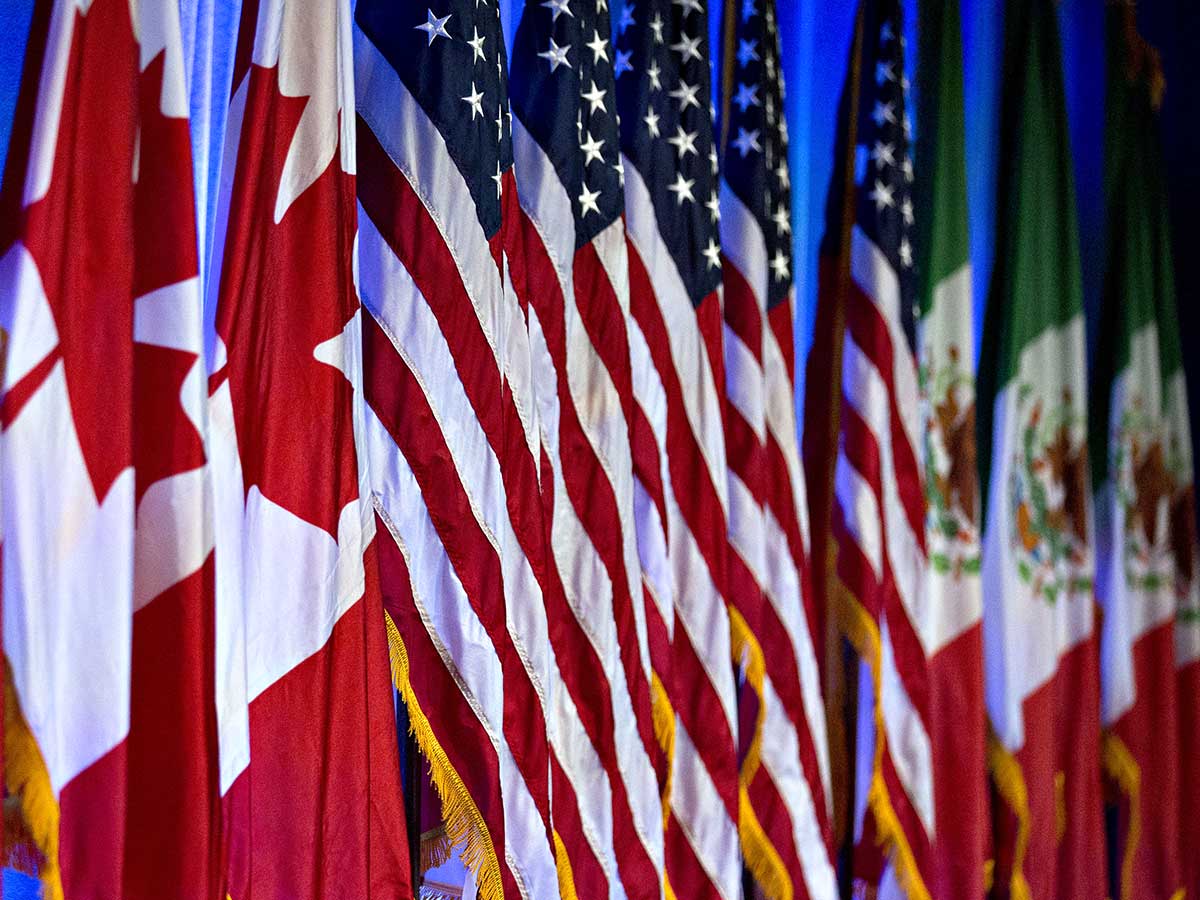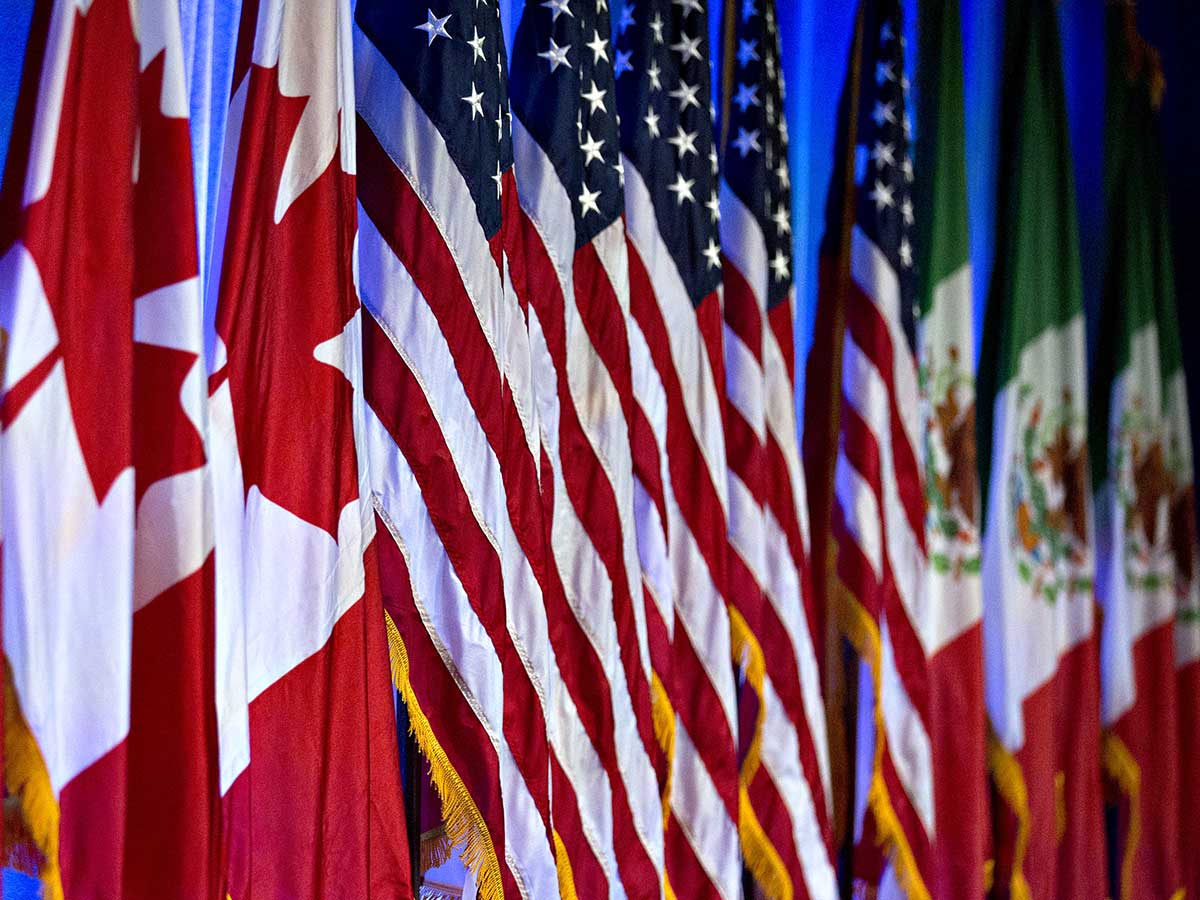
The new NAFTA: Know the impact of USMCA on your business
 Once in place, the USMCA deal will position Canada better from a trade, investment and overall economic standpoint, says Mark Warner, international trade lawyer and principal of MAAW Law. (Bloomberg Creative Photos/Getty Images)
Once in place, the USMCA deal will position Canada better from a trade, investment and overall economic standpoint, says Mark Warner, international trade lawyer and principal of MAAW Law. (Bloomberg Creative Photos/Getty Images)
As the world waits with bated breath for the USMCA trade deal—signed by the U.S., Canada and Mexico at the G20 summit in Buenos Aires, Argentina, in November—to be ratified, Canadian businesses can prepare themselves for its impact.
Thought by some to be nothing more than a revamped NAFTA, with small “wins” for Canada, others look to the new deal as a way forward towards growth and opportunity out of a time of uncertainty. Regardless of your standpoint, there are some key developments businesses should take heed of, legal experts say.
Here is a breakdown of some of them:
DIGITAL TRADE
Catching up with the global digital marketplace, the USMCA includes what NAFTA did not: a digital trade chapter with provisions around data flow and protection, e- commerce, cybersecurity, and so on.
Though modelled off much of what’s included in the Trans-Pacific Partnership (TPP) trade deal—renamed the Comprehensive and Progressive Agreement for Trans Pacific Partnership (CPTPP) after the U.S. withdrew in 2017—there are a few distinctions.
Data sovereignty: The USMCA includes restrictions on data localization policies used by companies to keep digitized personal information within a local jurisdiction. Provinces, such as British Columbia and Nova Scotia which have worked hard to keep sensitive public-sector information on home turf, may be threatened in doing so under these new rules.
Data flow: The USMCA does not include the same provisions as the TPP, which allows for parties to have independent regulatory requirements when transferring data. In other words, different approaches for cross-border data flow may not be accommodated under this new deal.
Transfer of Information: Under the USMCA, no party shall “prohibit or restrict” the transfer of information by electronic means, including personal information, for business purposes. The TPP’s language is different, saying parties “shall allow” this transfer of information.
“There are rules designed to remove obstacles to the flow of digital information used in the financial services sector,” says Clifford Sosnow, trade, investment and anti-bribery law adviser and co-chair of Fasken’s International Trade and Investment Group. “But there are exemptions and the challenge will be to determine whether the exemptions apply.”
Sosnow recommends financial professionals review the USMCA’s financial services chapter, which outlines new restrictions including market access, localization of computing facilities and cross-border data transfer.
“[The rules] are subject to a myriad of exceptions…but must be digested to properly understand the scope of benefits,” he says.
LABOUR MOBILITY
Despite it being one of Canada’s demands during trade negotiations, no ground was made on expanding the eligibility requirements for work visas for Canadian business professionals, including those in finance. Instead, provisions look much like they do under NAFTA, despite the demands of a digital economy and a more transient global workforce.
“The good news is, we kept what we had. The bad news is, they didn’t modernize it to include the newer classes that include the digital stuff,” says Mark Warner, international trade lawyer and principal of MAAW Law, who practices in Canada and the U.S.
The agreement does, however, allow for mutual recognition of professional qualifications for various professions, adds Sosnow, pending consent from relevant professional bodies. “Further liberalization on the cross-border movement of professionals will have to wait for another day,” he adds.
PLANNING, STRATEGY, COMPETITIVENESS
The USMCA impacts a broad range of industries from the automotive to agricultural sectors. Companies engaged in cross-border trade and investing should consider how the new rules will impact their business planning, strategy and competitive efforts.
“You’ve got to understand…how these rules in the agreement effect your supply chain,” shares Brenda Swick, international trade and investment lawyer, and partner, with Cassels Brock Lawyers. “Canadian businesses have to realize, this is only going to be one agreement of many that they can benefit from.”
Swick is referring to other trade pacts such as the Canada-European Union Comprehensive Economic and Trade Agreement (CETA), in effect as of 2017, which reduces and eliminates tariffs between Canada and the EU; and the CPTPP, targeted for 2019, which increases trade and investment opportunities amongst its 11-member nations.
Further on free trade agreements (FTAs) with other countries, the USMCA includes a provision with “non-market” economies, namely China, requiring disclosure of negotiations and agreement text at least 30 days before signing. A process to terminate the USMCA is a part of this, allowing for a modified bilateral agreement to replace it, which would exclude the party entering a new trade agreement with a “non-market economy” country. Some believe this is to discourage existing bilateral trade negotiations between Canada and China.
“While there are other non-market economies, this provision is most likely aimed at FTAs with China,” says Sosnow. “If Canada were to begin negotiating with China, it would have to provide more transparency than it otherwise would and be sensitive to its impact on the U.S. or risk a negative reception…and the threat of termination of the USMCA.”
Recent diplomatic tensions between Canada and China—sparked by key developments including Canadian officials arresting Huawei’s chief financial officer in Vancouver and the detainment of Canadian nationals by China, also leading to decisions to cancel Tourism Minister Mélanie Joly’s travels to China and the delay in opening a Canada Goose store in Beijing—leave the future of trade relations between the two nations in flux.
LOOMING TARIFFS
As for the persisting tariffs on steel and aluminum, Canadians were reminded by Foreign Affairs minister, Chrystia Freeland, during the CBC’s The National Conversation, that these are treated separately from the USMCA negotiations.
“That is a piece that is hanging overhead, which is having a real effect on businesses and families in Canada, the United States and Mexico,” says Maryscott Greenwood, CEO of the Canadian-American Business Council (CABC).
Swick doesn’t see the tariffs going away anytime soon. She recommends Canadian businesses turn their attention toward other trade deals. “You’ve got these retaliatory tariffs, they are causing a lot of harm and a lot of pain and so you have to take advantage of these other free trade agreements that Canada, quite nicely, is paving the way for companies to use so that they are not so reliant on the U.S.,” she says. (See The great unknown: NAFTA negotiations and tariffs show that companies should prepare for multiple outcomes now rather than waiting)
OPPORTUNITY OUT OF UNCERTAINTY
Though opinions vary on how Canada fares with the USMCA, there is consensus over the benefit of having a deal (almost) in place. Having more than a year of tough negotiations behind us is a stepping stone forward.
“Overall, it’s really good to have the negotiations concluded because the uncertainty that existed with the United States threatening to withdraw entirely or [switching] to a trilateral instead of a bilateral agreement…all of that was problematic for the business community,” says Greenwood.
Once in place, the deal will position Canada better from a trade, investment and overall economic standpoint, while allowing us to, ultimately, move forward with our most important trading partner, the United States, says Warner.
“To the extent that this agreement passes, that’s going to be one other layer of trade uncertainty that’s gone and that to me has been a huge problem in terms of big-ticket investment to Canada. That’s the real bonus to the Canadian economy,” shares Warner.
“But the reality is, we’ve got the world’s largest economy sitting right beneath us,” Warner says. “So that is still going to be the biggest and most important market for Canada and we’ve been able to preserve the bulk of what we gained in 1994.”
LEARN HOW TRADE WARS IMPACT BUSINESS
Interested in finding out more about how trade wars, like the NAFTA negotiations, impact business? Read CPA Canada’s Q&A, What trade wars mean for business, with Laura Dawson, Director of the Canada Institute at the Wilson Center.